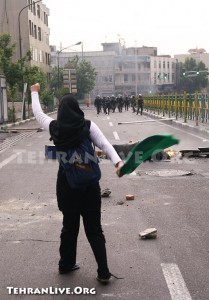 With the events unfolding in Iran over the past few days, there is no shortage of breathless commentary on the role of social media in what some will certainly dub Revolution 2.0. While following these events very closely as a social media advocate, I have to say that I resonate far more with the social story that is emerging than the media story. That’s not to say that the ways we’re seeing sites like Twitter, Flickr, YouTube and Facebook being used to galvanize Iranian protesters and inform the world is not compelling. But this stunning showcase of social technology would not exist without the profound depth of bravery, determination and community shown by so many ordinary Iranians.
With the events unfolding in Iran over the past few days, there is no shortage of breathless commentary on the role of social media in what some will certainly dub Revolution 2.0. While following these events very closely as a social media advocate, I have to say that I resonate far more with the social story that is emerging than the media story. That’s not to say that the ways we’re seeing sites like Twitter, Flickr, YouTube and Facebook being used to galvanize Iranian protesters and inform the world is not compelling. But this stunning showcase of social technology would not exist without the profound depth of bravery, determination and community shown by so many ordinary Iranians.
Although it’s impossible at this point to know the full impact technology is having on events on the ground in Iran, it’s obvious social media is bringing a far more compelling picture of what’s happening to anyone who wants to witness it, and that alone is revolutionary. While our major news networks perform the ponderous work of compiling and verifying a thin stream of facts according to the traditional time line of the 6am/6pm/10pm news cycle, bloggers and protesters are creating a real-time stream of first hand accounts of events as they happen. The beauty and the danger of this phenomenon is the heightened sense of involvement—that this is not only a domestic political event, but a profound and universal drama in which we all have a stake. By retweeting proxy IPs that Iranians reporting from the street can hop to evade network clampdowns, or joining a Denial of Service attack against the Web sites of the Iranian state, people all over the world are, in a way made possible only by technology, global participants in local events.
But to elevate this fascination with the growing power of social technology misses the most important point. Technology does not provide the passion for tens of thousands of people in Tehran to take to their rooftops and shout down a corrupt government. Technology does not draw hundreds of thousands of housewives, students and shopkeepers into the streets to face down frightening attacks by baton-wielding storm-troopers on motorbikes. Technology does not supply the courage for an unprotected crowd to stand in the face of sniping fire and hold their ground, and it does not provide the compassion of a crowd that protects a captured thug from violent reprisals. A country awash in social media technology is no guarantee of such monumental spirit shown by ordinary men and women in Iran today, resonating with one voice against a government that has failed them. Praising the technology is like celebrating the bullhorn rather than the message it carries.
I suspect when all is said and done we’ll find that as crucial as technology has been as a tactical aid for the early protests in Iran, the greater impact is the way the raw story from the streets became a universal story that vastly enlarged the community of protest, providing validation, and perhaps galvanizing the courage of those standing in the street, while reminding the rest of the world what it looks like to stand up against tyranny. As the Iranian government cracks down more aggressively on the vulnerable tools of social networking, it will be only that fabric of community and purpose that remains to bind them. There is no technology that can replace that.